Last Chance to Catch NYC's Holiday Notalgia Train
We met the voices of the NYC subway on our nostalgia ride this weekend!


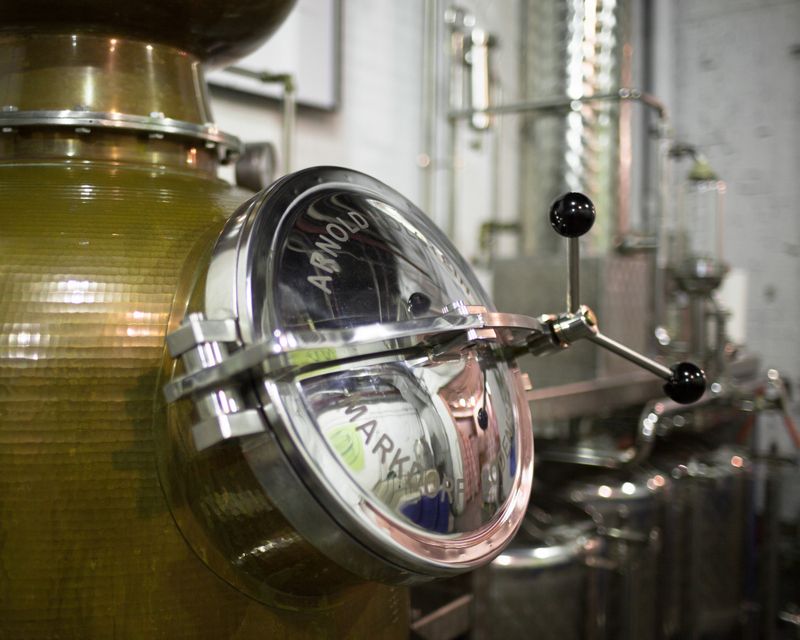
Photo via Greenhook Ginsmiths
Join us on a trip through the booze-soaked trenches of Brooklyn.
If you walk down Manhattan Avenue in Greenpoint, past all of the chic boutiques and vintage shops, then skip under the Pulaski Bridge before you hit the water, you come out on the other side to an abrupt change of scenery. You might almost miss the unassuming entrance of Greenhook Ginsmiths, distracted by the epic mural painted on the brick wall across the street. The distillery inhabits a warehouse surrounded by metal shops and a motorcycle repair joint – an odd spot for a former Wall Street capital markets broker to set up shop. There, beneath a small metal door with the 208 spray-painted over it, we meet Steven DeAngelo, head distiller and founder of Greenhook Ginsmiths.
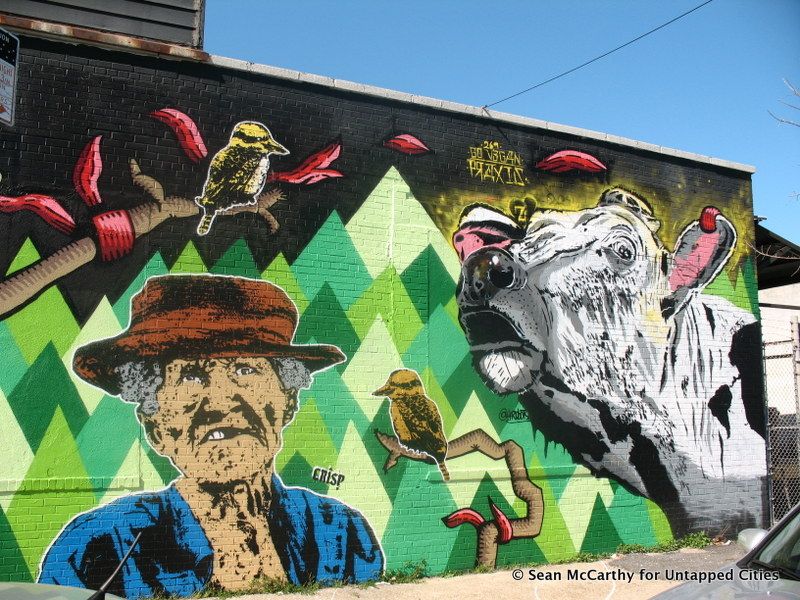
DeAngelo greeted us at the door in a Carhartt beanie, a well-worn puffy, stained jeans, and a crisp, pastel-pink button down. “How you doing guys, come on in.” He has a voice like gravel and butter whipped up into a faint Brooklyn accent. We shook hands and squinted, following him out of the bright sun and into the dark warehouse. DeAngelo moved nimbly around distilling equipment, through his office – a desk pushed into a corner and walled in by pallets of juniper berries – and into the sickly green glow of the distilling floor.
“Looks like we got cirrhosis”
He laughed and waved at the lights over head explaining that they were source of the eerie green pale that hung over the room. He uses explosion proof lights because, most days, he’s the only one there.
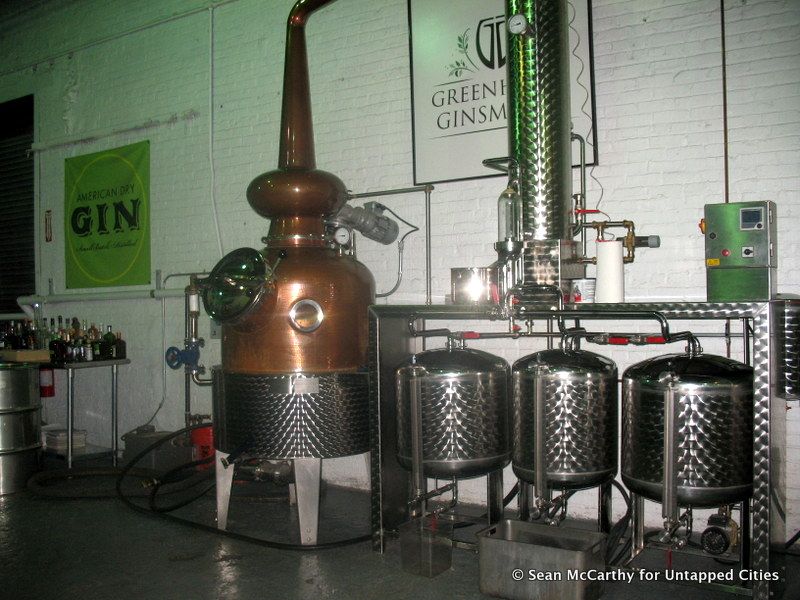
“I got a fire extinguisher and these lights, so if something goes wrong, I can take care of it myself.”
Everybody talks about the DIY spirit’s movement in Brooklyn, but DeAngelo is the personification of it. He grew up in Bayside and eventually went to Wall Street. After the crash in 2009, DeAngelo started weighing his options (presumably taking a lot more three martini lunches) and in 2010, he and his brother closed on a small warehouse space in Greenpoint.
While waiting two years for the city to approve his distiller’s license, he worked on Wall Street during the day and, at night, he began to put together the Greenhook Ginsmiths and study gin-distilling techniques. He studied a lot; he had to:
“I’m self-taught, completely self-taught. All the best distilling techniques were developed in the 18 & 1900’s. Can’t really apprentice with those guys, you know?”
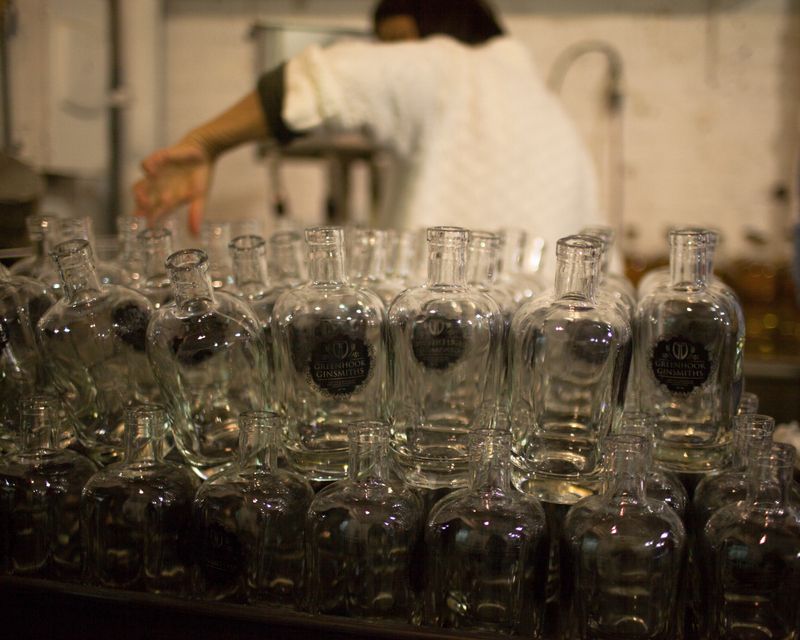
Photo via Greenhook Ginsmiths
In 2012 the Ginsmiths’ doors (really just the one door) opened and DeAngelo released his American Dry Gin and Beach Plum Gin Liqueur. In the years that followed Greenhook released an Old Tom Gin. Due the high demand for his product, and space required for barrel aging the Old Tom, Steven expanded into the empty warehouse next door.
The distillery’s trajectory is impressive, but it’s not the most impressive part of this story. DeAngelo does everything on his own – the PR, the marketing, the sales, the accounting, the stock room, and of course the distilling. The man must not sleep. He does however, allow himself the luxury of having six people come in and help him bottle for a day on the weekends. We were walking over to his custom-made, mercury-vacuum still as he explained all this and DeAngelo could tell we were floored. He laughed and told me, “It’s basically just a lot of shoe leather and concrete.”
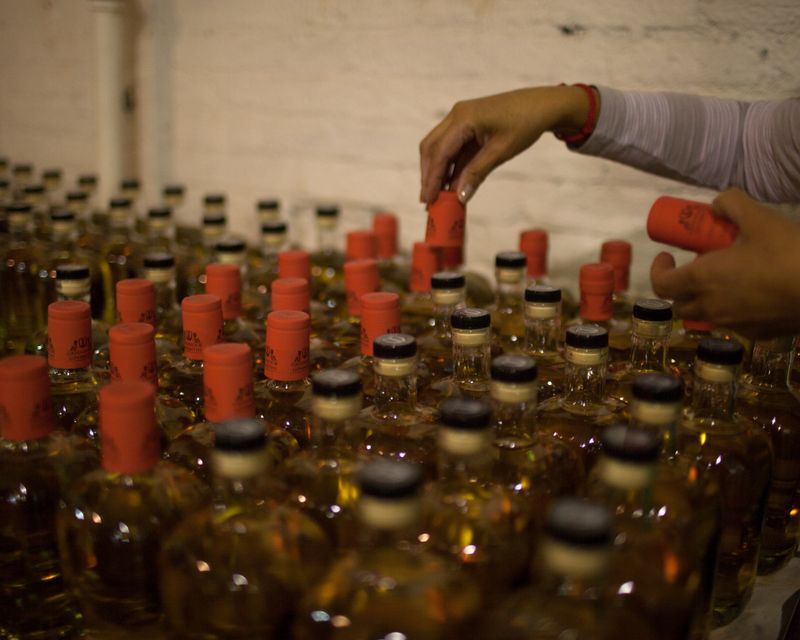
Photo via Greenhook Ginsmiths
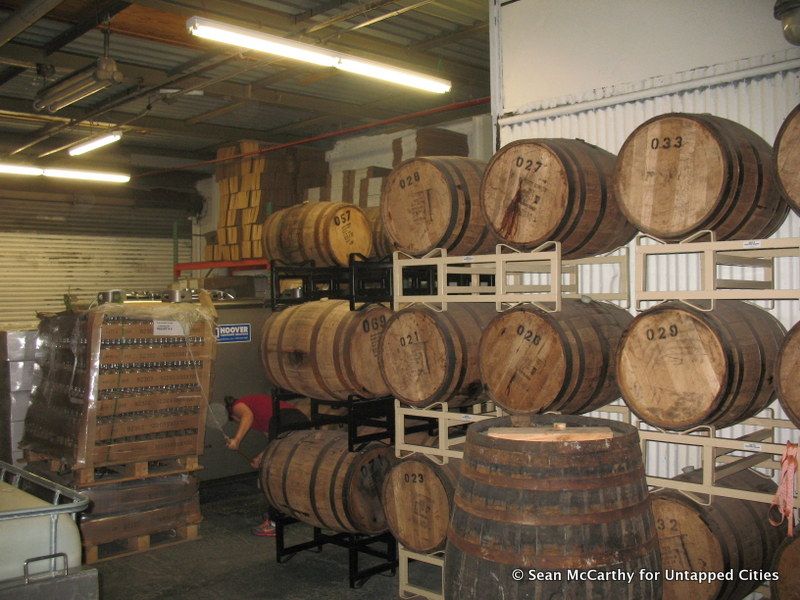
We had a feeling his job was a bit more complex then he made it out to be. As he started show us how Greenhook makes their (his) delectable gin, our hunch was confirmed. The gin begins as a ‘booze tea’ of wheat spirits, juniper berries, elderberries, elderflowers, chamomile, Ceylon cinnamon, orris root, coriander, and Thai ginger. Then it is run through the still.
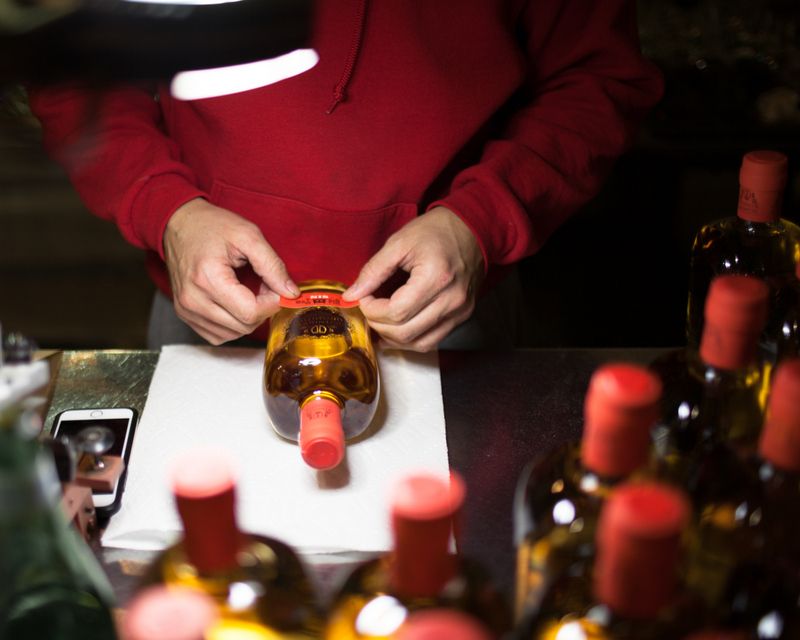
Photo via Greenhook Ginsmiths
The mercury vacuum-seal increases the atmospheric pressure in the still and allows the distilling process to take place at substantially lower temperatures. This is important when making gin because it is one of the few spirits that uses herbs and spices in the distilling process. DeAngelo explained:
“So you’re making sauce on top of the stove . . . and you got some fresh basil, it smells great. But when you introduce it into that simmering sauce the heat destroys a lot of the aromas and flavors you had before. The same thing is problematic in gin distillation.”
French perfumers originally invented this distilling technique in 19th century to preserve the fragile scents used to make perfume; DeAngelo now applies the technique to gin. The goal is to create a bright, vibrant, aromatic Gin and preserves all of the botanicals – and it works like a charm.
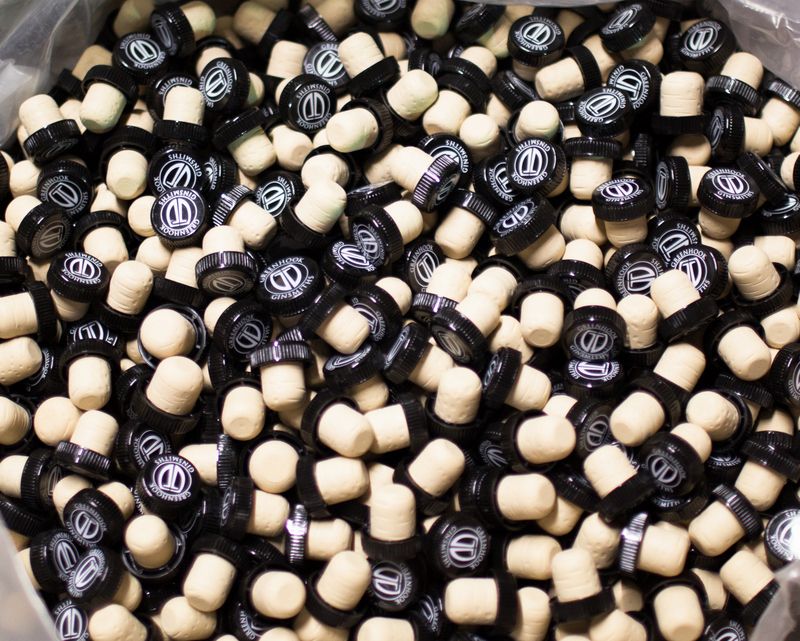
Photo via Greenhook Ginsmiths
Here are some of what we sampled at a tasting at Greenhook Ginsmiths:
The American Dry Gin
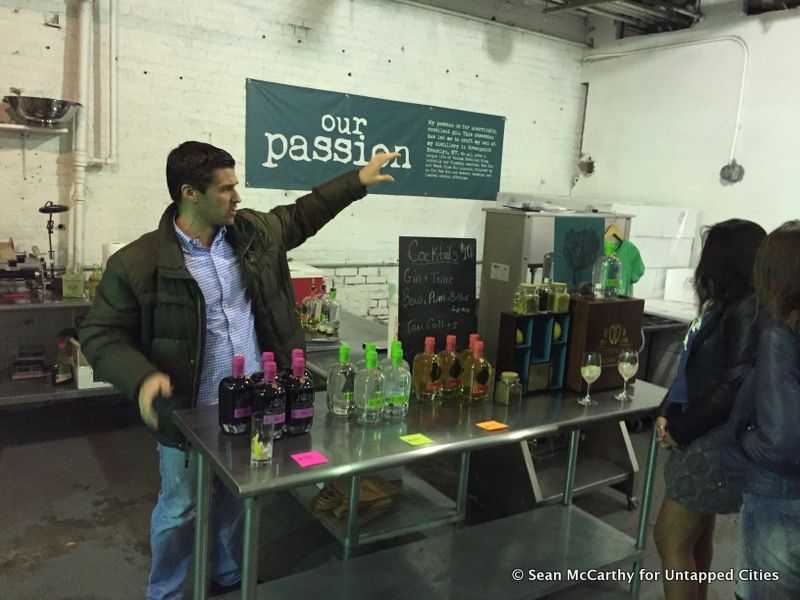
This is, simply put, an elegant gin – light, bright, and complex. The nose takes us back to hikes through great, tall ponderosas on a sunbaked trail, covered springy pine needles, just as summer awakens. There’s a burst of elderflower on the front end along with notes of juniper, chamomile and coriander. These flavors are supported by light hints of cinnamon and ginger.
DeAngelo was making G&T’s with a lemon peel and a sprig of sage, which were very nice. Though, full disclosure, we have been using it to mix a bone-dry martini with a twist and it’s the perfect spirit for it – the gin can stand alone.
The Old Tom
Greenhook’s Old Tom is an updated take on a style of gin common to Britain in the 1800’s. It’s aged 16-months in bourbon barrels and then finished for three months in Olorosco sherry casks. DeAngelo ages this corn-based spirit for far longer than his British predecessors and the product is significantly less sweet. You can still taste the fragrant elderflower and juniper berries that are in the Dry Gin but the warm perfume of spices is completely different.
DeAngelo took inspiration from the British spice trade during the 19th century to craft a gin that warms you to the core. The juniper hits you right off the bat, but then the gin eases into a palate of cardamom, cinnamon, and cloves (at least that’s what we got). Though this over-proofed gin (around 50% ABV) should be overpowering, the 19-month barrel aging mellows and blends it into a delicious buttery gin that tastes like Christmas.
Steven was mixing Tom Collinses with this one – quite tast –- though we can’t help imagining ourselves curled up with a Hot Toddy (Tommy?) and waiting out a blizzard with a good book.
The Beach Plum Liqueur
This is, hands down, the most unique spirit the distiller has made thus far. DeAngelo wanted make an American Sloe Gin but could not get his hands any sloe berries. Then he recalled the Beach Plums that grow on the coasts of Maryland and New York and thus – the beverage was born.
The liqueur has all of the botanicals from the American Dry Gin but Steven adds macerated Beach Plums, along with the plum stones, and lets the mixture sit for six months. You can smell ripe plums and dark cherries as you bring the glass to your nose. The liqueur is velvety and rich on your tongue and after the botanicals of the gin and the plums fade your left with a hint of marzipan — delightful.
DeAngelo also made us our new summer cocktail – Beach Plum Liqueur and bitter lemon soda. This drink is the perfect mixture of sweet and bitter and the carbonation from the soda cuts through the heavy liqueur, giving the beverage the perfect balance. We can’t think of a better way to drink this stuff, but he also recommend that you pour it over a glass of champagne.
If you’re visiting The Big Apple, this is a secret stop that you must make. And if you’re in New York City and you haven’t been over to Greenhook Ginsmiths – there’s always this weekend.
If you’re interested in taking a tour of Greenhook Ginsmiths with Untapped Cities, please let us know below. With enough interest, we’ll organize one!
( function () { const contact_forms = document.getElementsByClassName('contact-form'); for ( const form of contact_forms ) { form.onsubmit = function() { const buttons = form.getElementsByTagName('button'); for( const button of buttons ) { button.setAttribute('disabled', true); } } } } )();
Submit
Subscribe to our newsletter